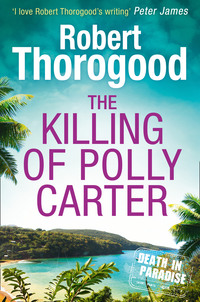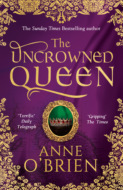Raamatut ei saa failina alla laadida, kuid seda saab lugeda meie rakenduses või veebis.
Loe raamatut: «The Killing Of Polly Carter»

About the Author

ROBERT THOROGOOD is the creator of the hit BBC One TV series, Death in Paradise.
He was born in Colchester, Essex, in 1972. When he was 10-years old, he read his first proper novel – Agatha Christie’s Peril at End House – and he’s been in love with the genre ever since.
He now lives in Marlow in Buckinghamshire with his wife, children and an increasingly cranky Bengal cat called Daniel.



ISBN: 978-1-474-03809-6
THE KILLING OF POLLY CARTER
© 2015 Robert Thorogood
Published in Great Britain 2015
by HQ, an imprint of HarperCollinsPublishers Ltd 1 London Bridge Street London SE1 9GF
All rights reserved including the right of reproduction in whole or in part in any form. This edition is published by arrangement with Harlequin Books S.A.
This is a work of fiction. Names, characters, places, locations and incidents are purely fictional and bear no relationship to any real life individuals, living or dead, or to any actual places, business establishments, locations, events or incidents. Any resemblance is entirely coincidental.
By payment of the required fees, you are granted the non-exclusive, non-transferable right and licence to download and install this e-book on your personal computer, tablet computer, smart phone or other electronic reading device only (each a “Licensed Device”) and to access, display and read the text of this e-book on-screen on your Licensed Device. Except to the extent any of these acts shall be permitted pursuant to any mandatory provision of applicable law but no further, no part of this e-book or its text or images may be reproduced, transmitted, distributed, translated, converted or adapted for use on another file format, communicated to the public, downloaded, decompiled, reverse engineered, or stored in or introduced into any information storage and retrieval system, in any form or by any means, whether electronic or mechanical, now known or hereinafter invented, without the express written permission of publisher.
Version: 2018-07-23
For Charlie and James
Table of Contents
Cover
About the Author
Title Page
Copyright
Dedication
Prologue
Chapter 1
Chapter 2
Chapter 3
Chapter 4
Chapter 5
Chapter 6
Chapter 7
Chapter 8
Chapter 9
Chapter 10
Chapter 11
Chapter 12
Chapter 13
Chapter 14
Chapter 15
Chapter 16
ACKNOWLEDGEMENTS
Extract
About the Publisher
Prologue
Detective Inspector Richard Poole sat on the verandah of his beachside shack looking up at the cloudless Caribbean sky in inarticulate outrage.
A passing parrot had just crapped in his cup of tea.
It didn’t seem possible, but Richard had watched the little bugger fly in over the sea and defecate in mid-air, the little ball of released guano flying in a perfect parabola only to land in his English Breakfast Tea with an accuracy, Richard realised, that Barnes Wallis could only have dreamed of.
In a spasm of disgust, Richard sloshed the contents of his china cup over the balustrade and tried to return his attention to the book he’d been reading. It was an old hardback he’d found at the back of the police station called A Field Guide to the Insects of the Caribbean, and he’d been fascinated by what he’d so far been able to learn from it. For example, he’d had no idea that the brightest bioluminescent insect in the world wasn’t in fact the firefly, but was a species of click beetle that lived in the Caribbean called the Fire Beetle.
But it was no good, Richard couldn’t settle back into his book, and instead he found himself glancing nervously back up at the sky every few seconds. After all, what if another parrot came for him out of the sun? Richard sighed heavily to himself. Honestly, when you got down to it, the Caribbean was a bloody nightmare from start to finish.
It didn’t help that he had already been in a bad mood that morning, even before the aerial bombardment. This was because Richard had a secret. A deep and dark secret he’d not even dared mention to his team yet. In fact, as he went through to the little galley kitchen at the back of his shack to wash up his tea things, Richard decided that there surely couldn’t have been another person on the whole island of Saint-Marie who was having as miserable a morning as him.
But he was wrong. There was someone.
This was because, just a few miles further along the coastline, a woman called Polly Carter was sitting in her kitchen wearing a bright yellow summer dress, drinking a freshly pressed glass of mango juice, and smoking a cigarette—and although she didn’t know it yet, she only had a few minutes left to live.
Polly was forty years old and a fashion model famous the world over for a look that in person could come across as gawky inelegance, but, in photographs, translated into a gap-toothed beauty. Her face had adorned billboards, magazine covers, and a rock group had once written a chart-topping record lionising her looks. Not that Polly took much notice of the hubbub that surrounded her life any more. She’d been trawling up and down catwalks since she was twenty-two years old, she’d earned more money than she’d ever dreamed—had spent even more—and all she wanted now was a break from it all. Which, ironically, she was about to get.
The door to the kitchen banged open, and Polly’s wheelchair-bound sister Claire was pushed into the room by her nurse, Sophie.
Claire and Polly were twins, although Claire was the older of the two by a few minutes. This should have created a special bond between the two sisters, but Claire was one of those older siblings who felt that it was her seniority that defined her entire relationship with her sister. So, because Polly was naturally impetuous, irresponsible, and had a wicked sense of humour, Claire was superior, overly responsible and felt that life was nothing to laugh about. This outlook was sharpened further by the fact that, following a riding accident ten years ago, Claire no longer had the use of her legs. It was no consolation to Claire that although she and her sister were non-identical, she was blessed with an uncanny beauty very similar to her famous sister’s. But then, as Claire would remark to anyone who cared to listen, her and her sister Polly’s supposed good looks only ever seemed to become apparent in fashion photographs, and who ever took fashion photographs of a cripple?
‘Well this is a first, you’re already up,’ Claire said to Polly as Sophie finished pushing her over to the breakfast bar.
‘Is that so surprising?’ Polly asked, briefly thrown by her sister’s tone.
‘Well, you don’t normally get up before lunchtime, so yes, I’d say it was a surprise.’
Polly was affronted.
‘I don’t just laze about all day, you know.’
‘Oh you don’t, do you?’ Claire said with a disdainful laugh, and Polly looked at her sister a long moment before—very slowly—plucking another cigarette from the battered pack on the table and lighting it.
Once she’d taken a long, rasping drag from her cigarette, Polly said, ‘Look, if you must know, I only got up this morning so I could spend some time with you.’
‘Ha! Well, that’s a first,’ Claire said, still unable to take her sister at all seriously.
Claire’s nurse, Sophie Wessel, was used to how Claire bickered with her sister Polly—and vice versa—so she tuned the two women out while she made some coffee for herself and Claire. It wasn’t in her job description to make drinks for her client, but Sophie had soon learnt that Claire was one of those people who not only expected her nurse to push her wheelchair and help with all of the tasks she wasn’t capable of doing herself, but she also felt that Sophie should act as her personal assistant and lackey.
Once Sophie had pushed the plunger down on the cafetière, she turned back to the room only to see Polly wheeling Claire out of the kitchen door and into the garden.
‘Would you like a coffee?’ Sophie asked the sisters before they left the room.
‘No thanks,’ Claire said. ‘Polly says she wants to take me for a walk in the garden.’
‘You do?’ Sophie said, surprised. She and Claire had been house guests of Polly’s for the last ten days, and Polly hadn’t once offered to push her sister’s wheelchair in all that time.
‘I do,’ Polly said with a tone that made it clear she expected Sophie to back off.
Sophie didn’t want to get in between the two sisters, but pushing a wheelchair wasn’t easy.
‘No, really,’ she said. ‘Let me push Claire for you.’
‘I said I’d be fine,’ Polly said, irritation flashing in her eyes.
Sophie looked at Claire for guidance, but Claire just shrugged. She didn’t seem to care one way or another. So Sophie kept silent as Polly pushed her sister out into the garden.
Once she’d been left on her own, Sophie finished pouring herself a cup of coffee, left the kitchen and went into the main hallway of the house. It was a large space with a wide wooden staircase that swept up to a minstrel’s gallery that went around all four walls of the house, and led onto the various bedrooms, bathrooms and private suites upstairs.
But as she entered the hallway, Sophie hung back in the shadows because Polly’s agent, Max Brandon, was already heading up the stairs, a bunch of files and papers clutched in his hands. Max was a thin man in his early fifties who was wearing round sunglasses with yellow lenses, a midnight-blue velvet jacket and burgundy cord trousers, and Sophie suspected he dyed his hair to keep it so lustrously black.
Sophie didn’t much like him, but she made herself say, ‘Good morning, Max,’ to his retreating back. Fortunately for Sophie, Max didn’t hear her—or pretended that he didn’t hear her—and she watched him head up to the top of the stairs and disappear, she presumed, to his bedroom. Sophie was about to head for the stairs herself when she heard a shout from outside.
It sounded like a woman’s voice.
Sophie looked through the large picture windows that overlooked the garden and saw Polly standing at the far end of the lawn shouting at Claire in her wheelchair. Sophie couldn’t hear exactly what was being said, but it was clear that Polly was angry with her sister about something.
Sophie knew that while it was one thing for the sisters to be irritable in each other’s company, it was quite another for the able-bodied Polly to take her wheelchair-bound sister into the garden and then start shouting at her.
There was a doorway in the corner of the hall that led straight onto the garden and Sophie went through it to see if she could intervene, but as soon as she crunched out onto the gravel path outside, Polly looked over at her. She then grabbed hold of the handles of Claire’s wheelchair and pushed her further into the garden, soon disappearing beyond a large clump of bushes.
Sophie briefly hesitated. Polly’s house—mansion, really—was built high on a bluff above the ocean, and Sophie knew that the direction that Polly had taken Claire led to a sheer cliff face that protected a horseshoe-shaped bay and private beach far below. Sophie started across the lawn, but before she’d even gone half a dozen steps she very distinctly heard Claire shout ‘Stop it!’ from beyond the bushes.
Sophie looked back at the house. Had no one else heard or seen anything? It was hard to see if anyone was even looking out, such was the glare of reflected sunshine from the windows, but Sophie caught a movement at one of the upstairs windows. Someone was looking out at the garden, even though this person was in shadow, and she couldn’t quite tell who it was.
A woman’s scream pierced the air. Sophie’s head whipped round. The scream had come from beyond the bushes in the direction of the cliff.
Sophie then very distinctly heard Claire shout, ‘Oh dear God, someone help!’
Sophie broke into a run, and, as she got past the bushes, she could see Claire sitting in her wheelchair over by the top of the cliff where steps led down the cliff face to the beach below.
As for Polly, she was nowhere to be seen.
‘Help me!’ Claire screamed as Sophie approached. ‘She just jumped!’
Claire turned her wheelchair away from Sophie and started racing off along the curve of the cliff’s edge as it swept around the bay.
‘What’s going on?’ Sophie asked as soon as she caught up with Claire.
‘I couldn’t follow her, she ran down the steps!’
As Sophie looked down to the beach far below, she finally understood why Claire had been pushing herself so desperately along. It was only this far around the curve of the cliff top that it was possible to look back and see the stone steps that ran in loose zig-zagging flights from the top of the cliff all the way down to the private beach a hundred or so feet below.
There was a body lying in the sand at the base of the cliff.
A body that was wearing the same bright yellow dress that Polly Carter had been wearing only moments earlier.
Sophie turned to look at Claire and saw that she was physically shaking, and her eyes were wide and staring as she replied, ‘She said I was evil, she said I’d ruined her life …’ Claire took a sharp intake of breath to allow herself to finish her sentence. ‘She said she was going to end her life.’
‘What?’
‘She said it was all my fault. That she was going to end her life. And then she ran down the steps and jumped!’
Sophie knew that Claire could wait. As a trained nurse, she was needed elsewhere.
‘Don’t move,’ she said, before starting to sprint back along the cliff top, her breath loud in her ears as she pumped her arms hard, knowing that every second of delay could be critical. She had to get to Polly.
Reaching the stairs that led down to the beach, Sophie didn’t stop to think, she just barrelled down them—taking the uneven stone steps two at a time as she careened down the cliff, her arms out wide for balance, until her flip-flopped feet finally slapped onto the hard white sand far below.
Sophie took a moment to recover her breath. She then looked around to see if there was anyone nearby who could help, but the beach was entirely empty, perhaps unsurprisingly so. At this time in the morning, everyone else was almost certainly back at the house.
But Sophie could see that the body in the yellow dress was lying near the base of the cliff about thirty feet away.
It was Polly. And she wasn’t moving.
Sophie strode across the sand as quickly as she could, but even as she approached the body, she could see that Polly’s legs were splayed at an almost unnatural angle—she had an arm jammed under her body—and her eyes were closed.
Sophie bent down, put two fingers to Polly’s neck and tried to find a pulse.
There wasn’t one.
Sophie gulped.
She stepped back, looked back up to the top of the cliff and saw the tiny figure of Claire still looking down from her wheelchair.
Sophie cupped her hands to her mouth and shouted up, ‘We need an ambulance! At once!’

At the same time that Claire pushed herself back to the house and Sophie turned the body of Polly Carter over to see if she could begin to administer CPR, Richard Poole was inside his shack having a shower. Or rather, in a world where the shower mixer provided him with periods of cold water interspersed with impossible-to-judge periods of water so hot it could sear skin, he was trying to time his dips into the shower so that he could wash his hair without getting third-degree burns. And it was just as he was waiting for the next pulse of boiling water to hit him—with his eyes scrunched up against the shampoo already dripping down his face—that Richard felt something skitter up his leg and then stop at his knee.
Richard froze.
There was a creature on his leg. And he was completely naked. His hand reached ever-so-slowly for his towel so he could wipe the soap from his eyes and finally see what stinging scorpion or venomous spider had just run up his leg. But before he could reach his towel, the creature started running upwards again and Richard opened his eyes against the screaming pain of soap, saw a bright green lizard racing up his thigh—a lizard that Richard had been sharing his shack with ever since he’d first arrived on the island, and who, in more innocent times, he’d thought it would be amusing to name Harry—but before the creature could reach the danger area of Richard’s groin, he grabbed up his towel, swiped, missed, slipped on some soap, and fell arse over tip to the floor.
As Richard lay bruised and panting on the floor of his shower room under a stream of water that was sometimes freezing cold and at other times boiling hot, the sting of soap still in his eyes, and with a crushing sense of defeat from being once again outwitted by a reptile only eight inches long, he decided that yes, now he was surely the unluckiest person on the whole island of Saint-Marie that day.
And he was still wrong. Because that honour belonged to the world-famous supermodel, Polly Carter.
Because it was the day she was pushed from the top of a cliff, fell nearly a hundred feet to the hard sand below, and broke her spine and neck on impact, dying instantly.
It was the day Polly Carter was murdered.
Chapter 1
Richard Poole’s dark secret was that his mother Jennifer was about to arrive on the island. Why on earth she’d chosen to visit on her own, Richard had no idea, but he also had no idea how he was going to get through two weeks of keeping her company, and that seemed the more pressing problem.
It’s not that Richard didn’t like his mother. In fact, if he interrogated his feelings, he knew that he must even love her, it’s just that she was so perfect that he found her company exhausting. Her clothes were perfect, her friends were perfect, her whole life was perfect. She didn’t complain, she didn’t even express her feelings as far as Richard could tell, she just got up before everyone else, did more than everyone else, and then retired to bed once she’d done all the cleaning and tidying up and made sure that everyone else had turned in first.
If even a single thread stuck up from any of the immaculate plush carpets in her home, Jennifer would get down on her hands and knees and use nail scissors to give the individual thread a haircut. And after she did the washing up—always wearing washing-up gloves, of course—she’d then put on a second pair of washing-up gloves so that she could wash up the first set of washing-up gloves—unaware, Richard thought, that she risked falling into a logical feedback loop where she spent the rest of her life washing up the gloves she’d just used to wash up in. When Richard had tried to explain this to his mother, she’d smiled delightedly–‘You’ve always been so clever, darling’—and then gone off to plump up sofa cushions with her bare fists.
It was fair to say that Richard had a complicated relationship with his mother.
Far more so, in fact, than he did with his father. After all, his father, Graham—a one-time Superintendent in the Leicestershire Police Force—was entirely consistent in how he handled his son. No matter what Richard did, it always left his father disappointed. What was more, Graham was always the first to point that he’d done the same thing as Richard, but much better—or at an earlier age—or he’d chosen to go down a different path entirely.
So, when Richard was the first member of his family to be sent to private school, his father had managed to give the impression that it was only because no one thought Richard was clever enough to get into the local state-funded grammar school, where Graham had himself gone. And as top scholar—a fact Graham managed to mention nearly every time he was alone with his son, which, if truth being told, wasn’t that often.
Seven years later, when Richard got a place at Cambridge University, he finally felt that he’d proven to his father that he did indeed have a brain, but on the one occasion that Graham Poole visited his son in the three years he was there, Graham spent the day pronouncing that he himself had of course gone to the ‘University of Life’ where he’d learnt the real lessons in life, got the rough edges knocked off him quicker, and he’d not turned out too badly, had he?
When Richard announced that he was going to join the police force—as his father had done—Graham had sucked air in through his teeth as though Richard was making a very brave choice indeed. And then, when Richard threw a party to celebrate his promotion to Detective, his father was too busy at a local Rotary event to attend. His mother came, though, and did the buffet beforehand and hoovering afterwards.
In short, Richard would have been hard pressed to know which of his two parents he’d have more difficulty spending two weeks with: his dad, who always looked at him with such disappointment; or his mum, who always looked at him with such hope.
There was a loud honk from outside his shack and Richard snapped out of his reverie. His mother wasn’t due to arrive on the island until later that afternoon, so who was that outside trying to get his attention? The car horn honked again. And, before Richard could even get up, it honked again another two times.
Richard’s shoulders sagged. There was only one person on the whole island who’d so rudely interrupt his peace like this, so he went through his galley kitchen and opened the back door. Or rather, he tried to open the back door, but, as was typical, it was jammed shut by a build-up of sand on the other side. This was merely one of the almost infinite number of ways that the Caribbean tried to spoil his entire existence, Richard knew. All it took was a light breeze and a sunny day to loosen the individual grains of sand on the beach—and it was always a bloody sunny day—and whole dunes would start to build up against the walls of his shack.
Giving the door a proper shove with his shoulder, Richard finally got the door moving, the whole lean-to annexe to his shack shuddering as he finally managed to scrape the door open.
Richard briefly flinched at the sudden burst of sunlight—he never got used to how much sunshine there was in the Caribbean—but he saw that his initial suspicions had been correct. Detective Sergeant Camille Bordey was waving a happy hello to him from the driver’s seat of the battered police Land Rover.
Camille’s skin glowed in the sunshine, her hair was glossy and untamed, and she wore an electric-blue vest top, but Richard didn’t much notice any of this, if only because he knew that the staff rota had Camille down as having a day off, so why had she turned up at his shack?
‘Careful of that sand, sir!’ Camille said with mock seriousness as he awkwardly picked his way across it. ‘It might get into your socks.’
Richard knew that Camille found it incomprehensible that he insisted on wearing a dark woollen suit, polished shoes, a white shirt and a tie in the tropics, but, for him, the matter was a simple one. A policeman wore a dark suit, and Richard didn’t see why he should have to lower his standards just because he’d been posted to the Caribbean.
‘What are you doing here?’ Richard asked.
‘Oh, and a good morning to you, too,’ Camille said, now a lot less jauntily.
‘But it’s your day off,’ Richard said, unable to stop himself from glancing at his wristwatch to make sure his mother hadn’t in fact landed on the island yet.
‘What’s up?’ Camille asked, sharp as a knife, and Richard cursed silently to himself. His subordinate never missed a thing.
‘Oh, nothing,’ he said with what he hoped was insouciance.
‘Why are you looking so guilty?’
‘I’m not looking guilty.’
‘You are.’
‘I’m not.’
‘You are.’
There was a long pause while both of them realised that the conversation wasn’t going anywhere.
‘I’m not,’ Richard said.
‘You are.’
‘Look,’ Richard said. ‘Much as I’d love to continue this game of “You are, I’m not”, can you please tell me what on earth you’re doing at my house on your day off?’
Camille’s jaw set in instant irritation, and Richard wondered what he’d done wrong this time. As ever, he found Camille’s inner thoughts impossible to divine. On the one hand this was because she was female, spontaneous, passionate and always wanted to think the best of people, and—on the other hand—it was because she was French, which, Richard felt, was what military analysts would very much call a ‘force multiplier’. So, as Richard stood sweating on the white sand in his Marks & Spencer suit, he genuinely didn’t know how he’d managed to cause offence, and had even less of an idea about how to mend the situation.
‘Okay,’ Camille eventually said. ‘I’ll tell you what I’m doing here, but on the condition you tell me what that book is.’
Camille indicated the book in Richard’s hand. He’d picked it up just before he’d left his shack. It was his intended lunchtime reading.
‘Oh this?’ Richard said, only now realising that the book wouldn’t be that easy to explain. ‘It’s just a … you know, a field guide to the insects of the Caribbean.’
Camille’s eyebrows rose at this news. ‘I’m sorry?’
‘I, um, I found it at the station, and I thought it would be fun to learn about the insects of the Caribbean.’
‘You thought it would be fun?’
‘Yes.’
‘Learning about the insects of the Caribbean?’
‘Anyway, I’ve told you what I’m reading. You’ve now got to tell me why you’re here.’
‘Oh,’ Camille said, as though it were of no consequence. ‘There’s been a suspicious death.’
‘What?’ Richard blurted.
Camille grinned, and said, ‘Sorry. Should I have said sooner?’
Richard dashed round to the passenger side of the police jeep, opened the door and climbed in.
‘Yes you bloody well should have said sooner!’ he huffed, belting himself into the passenger seat as fast as he could.
Camille watched her boss make sure that his buckle was properly clicked into its housing, then check there were no twists in the belt itself as it went over his shoulder, before then giving two tugs on the strap to confirm that the auto-lock mechanism was indeed working satisfactorily.
‘Come on,’ he said impatiently. ‘What are you waiting for?’
Camille couldn’t help but smile to herself as she put the jeep into a low gear and drove off across the bumpy sand in the direction of the main road.

As Richard walked into Polly Carter’s house for the first time, he sneezed. This was because it may have been a grand villa in a stunning jungle setting—with orange-painted shutters to the windows, a bright blue front door and a red-tiled roof—but it was as messy as hell on the inside, and everything was covered in dust. Artefacts from Polly’s world travels, random pieces of furniture, local artworks and stacks of old magazines, books and photos were piled pell-mell so that sharp-edged Perspex awards sat next to ancient tribal masks, the antique dining table had modernist chrome chairs arranged around it, and the walls were just as crammed with modern collages as they were with faded oil paintings.
But it was only when Camille showed Richard the garden that he knew the meaning of true horror, because he discovered that the house was built near a cliff, and he was now expected to walk down the stone steps that had been carved into it so he could reach the body on the beach below.
‘But there’s no safety rail!’ he said as he stood looking at the Health and Safety nightmare that lay ahead of him.
‘Come on,’ Camille said. ‘We need to get to the body. And it’s not as bad as it looks.’
Richard looked at the stone steps again and saw that maybe Camille had a point. They were roughly hewn, but they were a good four or five feet wide. What’s more, although there was a vertical drop to almost certain death if you fell over the edge, there was actually a little escarpment of dirt and scrubby bushes and thorns running along the edge of the stairs to give the appearance of safety. And to divide the challenge into more manageable chunks, Richard could see that the whole staircase doubled back on itself four or five times as it wound its way down the cliff face. In fact, Richard realised, even if he fell over the edge, there’d be a chance he’d perhaps have his fall broken by the stone steps on the flight of stairs directly beneath.
In conclusion, Richard decided, it was scary, but he could do it. It helped, of course, that he was wearing such sensible shoes, he kept telling himself in a repeated mantra as, arms wide, he took six or seven minutes to pick his way down to the beach far below.
Once there, Richard could see, with relief, that Sergeant Fidel Best and Police Officer Dwayne Myers were already working the scene. Or rather, he was relieved to see that Fidel was working the scene. Richard’s feelings towards Dwayne were a little more nuanced. This was because, whereas Fidel was young, fresh-faced and lived and breathed correct police procedure, Dwayne had been on the force a number of decades, had refused every offer of promotion in all that time, and felt that following correct procedure was for ‘other people’. For Dwayne, in fact, his work was only partly about catching criminals, because it was also about making sure he knocked off on time so he could take one of his many and apparently concurrent girlfriends out partying every night. And the problem for Richard was, much as he’d like to chastise Dwayne for his lax attitudes, on an island like Saint-Marie, it was often Dwayne who got the results, if only because he drank in the same bars as the island’s dealers, grifters and general ne’er-do-wells. And, more improbably, he was accepted by them, to Richard’s eternal frustration.








